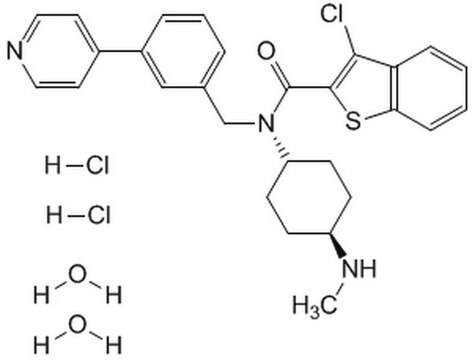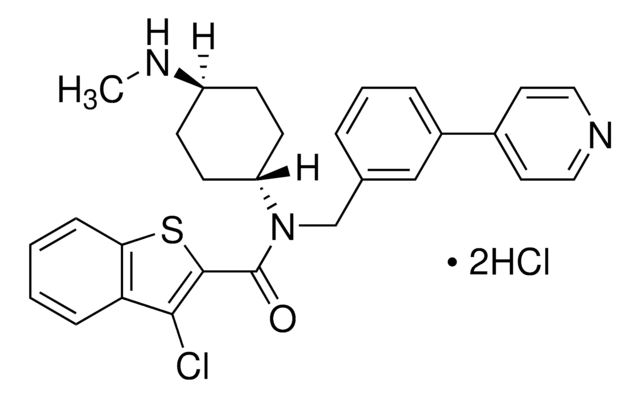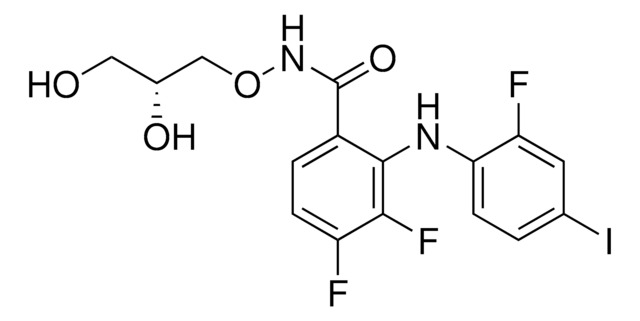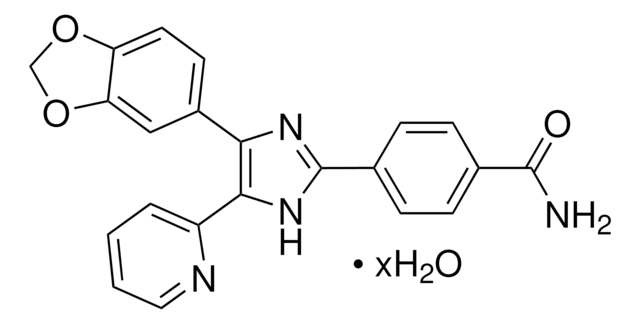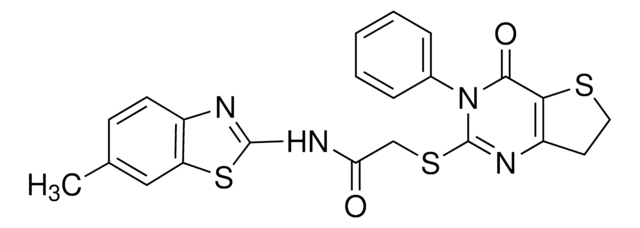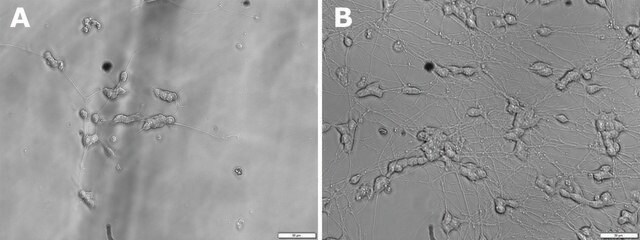566661
SAG
≥95% (HPLC), liquid, smoothened agonist, Calbiochem®
Synonym(s):
InSolution Smoothened Agonist, SAG, SAG 1.3 in Solution, SAG1.3 in Solution
Sign Into View Organizational & Contract Pricing
All Photos(1)
About This Item
Empirical Formula (Hill Notation):
C28H28ClN3OS · 2HCl · xH2O
Molecular Weight:
562.98 (anhydrous basis)
UNSPSC Code:
12352200
NACRES:
NA.77
Recommended Products
product name
Smoothened Agonist, SAG, InSolution, ≥95%, 10 mM aqueous solution
Quality Level
Assay
≥95% (HPLC)
form
liquid
manufacturer/tradename
Calbiochem®
storage condition
OK to freeze
protect from light
shipped in
wet ice
storage temp.
−20°C
General description
A cell-permeable benzothiophene compound that modulates the coupling of Smo with its downstream effector by interacting with the Smo heptahelical domain (KD = 59 nM). Shown to induce Hedgehog pathway activation (EC50 ∼3 nM in NIH 3T3-derived Shh-LIGHT2 cells) and counteracts Cyclopamine-KAAD (Cat. No. 239804) inhibition of Smo. Reported to act as an activator at low concentrations and as an inhibitor at very high concentrations.
Packaging
Packaged under inert gas
Warning
Toxicity: Standard Handling (A)
Physical form
A 10 mM (500 µg/86 µl) solution of Smoothened Agonist, SAG (Cat. No. 566660) in H₂O.
Reconstitution
Following initial thaw, aliquot and freeze (-20°C).
Other Notes
Meloni, A.R., et al. 2006. Mol. Cell. Biol.26, 7750.
Chen, W., et al. 2004. Science306, 2257.
Chen, J.K., et al. 2002. Proc. Natl. Acad. Sci. USA99, 14071.
Frank-Kamenetsky, M., et al. 2002. J. Biol.1, 10.
Chen, W., et al. 2004. Science306, 2257.
Chen, J.K., et al. 2002. Proc. Natl. Acad. Sci. USA99, 14071.
Frank-Kamenetsky, M., et al. 2002. J. Biol.1, 10.
Legal Information
CALBIOCHEM is a registered trademark of Merck KGaA, Darmstadt, Germany
Storage Class Code
12 - Non Combustible Liquids
WGK
WGK 2
Flash Point(F)
Not applicable
Flash Point(C)
Not applicable
Certificates of Analysis (COA)
Search for Certificates of Analysis (COA) by entering the products Lot/Batch Number. Lot and Batch Numbers can be found on a product’s label following the words ‘Lot’ or ‘Batch’.
Already Own This Product?
Find documentation for the products that you have recently purchased in the Document Library.
Customers Also Viewed
Shichao Duan et al.
The EMBO journal, 40(2), e105499-e105499 (2020-11-27)
Cilia of higher animals sense various environmental stimuli. Proper ciliary signaling requires appropriate extent of BBSome-mediated export of membrane receptors across ciliary barrier transition zone (TZ) through retrograde intraflagellar transport (IFT) machinery. How the barrier passage is controlled, however, remains
Qingqing Yan et al.
Nature communications, 13(1), 53-53 (2022-01-12)
R-loops are three-stranded nucleic acid structures that accumulate on chromatin in neurological diseases and cancers and contribute to genome instability. Using a proximity-dependent labeling system, we identified distinct classes of proteins that regulate R-loops in vivo through different mechanisms. We
Ana Petracovici et al.
Molecular cell, 81(12), 2625-2639 (2021-04-23)
The Polycomb repressive complex 2 (PRC2) is an essential epigenetic regulator that deposits repressive H3K27me3. PRC2 subunits form two holocomplexes-PRC2.1 and PRC2.2-but the roles of these two PRC2 assemblies during differentiation are unclear. We employed auxin-inducible degradation to deplete PRC2.1
Jasmin Bartl et al.
Nature communications, 13(1), 4061-4061 (2022-07-14)
Most lncRNAs display species-specific expression patterns suggesting that animal models of cancer may only incompletely recapitulate the regulatory crosstalk between lncRNAs and oncogenic pathways in humans. Among these pathways, Sonic Hedgehog (SHH) signaling is aberrantly activated in several human cancer
Li Li et al.
Nature metabolism, 3(9), 1242-1258 (2021-09-11)
Mitochondria are the main site for generating reactive oxygen species, which are key players in diverse biological processes. However, the molecular pathways of redox signal transduction from the matrix to the cytosol are poorly defined. Here we report an inside-out
Our team of scientists has experience in all areas of research including Life Science, Material Science, Chemical Synthesis, Chromatography, Analytical and many others.
Contact Technical Service